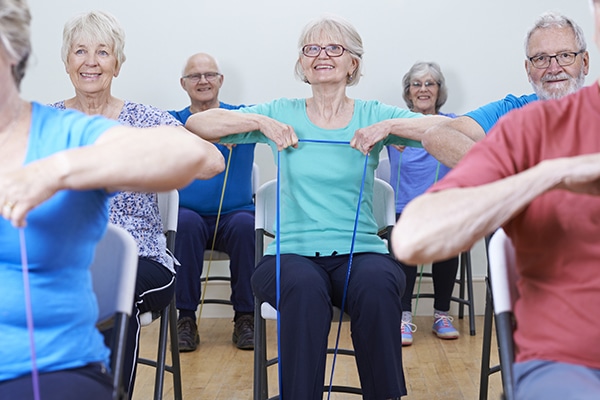
When I worked in care homes for older people, an important goal we had was to encourage people to be as active and socially involved as possible. We introduced several projects.
One of the most productive was to have regular exercise sessions in the building. We worked with people’s level of ability, and within the guidance of medical advice. The weekly sessions involved simple sitting exercises (although people could stand if they so wished). We demonstrated easy stretching exercises, deep breathing and basic joint rotation. These encouraged greater mobility and independence in physical daily living. Equally important was the fact that social interaction increased: there was a buzz about these sessions, where people compared their own performances and lost some of the ordinary inhibitions about starting and continuing conversations.
Recent Research
A study has recently been published in the British Medical Journal (BMJ), involving experts including from Oxford University and the UK’s Centre for Better Ageing. They demonstrate that encouraging more regular exercise can restore older people to their level of health ten years previously. The authors state that too often we encourage older people to sit down and take it easy. But inactivity is one of the major causes of illness in our society.
They argue that lack of activity leads to a lack of fitness, which is often ascribed to the effects of ageing. This is a vicious circle of decreasing activity contributing to declining health. It can be avoided, by carers recognising the dangers of a lack of fitness and attempting to address this through encouraging activities and interactions.
Increased exercise could cut our UK average £100 billion expenditure annually for social care. The incidence of falls and consequent fracture, the severity of dementia, loss of independence and other long-term conditions have been shown to respond favourably to increased regular exercise. The researchers concluded that “rather than putting their feet up and taking it easy, older people need to be up and active in order to stay healthy and independent.”
Individual Approaches
In today’s context of personalisation and inclusion, we need to consider the needs and aspirations of the person for activity, exercise and social interaction. This must be part of the support plan from the beginning if these experts are right. It will also take a change of cultural attitudes: we retire to take it easy, don’t we? But that endangers fitness, and loss of health can ensue. I all too often hear of people who retire and their health rapidly declines. This can often be attributed to a sudden change in levels of activity, which can and should be easily addressed.
This research and similar studies have implications for us all: we need to keep active in our lives, we need to encourage others to be active including those we care for, and commissioners and planners can look at infrastructure which enables this health-giving and money-saving approach to ageing.






